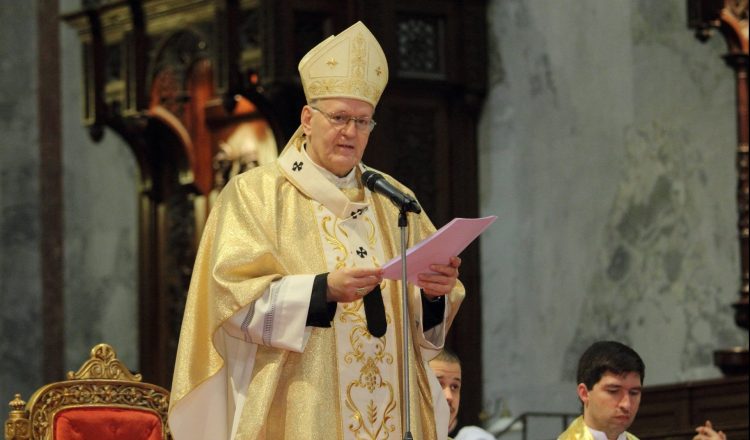Your Excellency, Apostolic Nuncio,
Your Excellencies,
Dear brothers and sisters in Christ,
- We are having a scientific conference on the Eucharist We are preparing for the International Eucharistic Congress. And according to the belief of our Church, this sacrament is a sacrifice, a feast and a holy presence. Christ gives himself for us. For our salvation, out of love and obedience towards the Father. His sacrifice is renewed without bloodshed, or - to be more precise - becomes present in each and every Holy Mass. The sacrifice on the cross is one and only, but in every mass, it is a reality being renewed again and again. How does this happen? - From our side, from the point of the men it is a great secret, a real mystery. But from the side of God, time is not a limit. The "before" and the "after" exists only in this world. God's life is eternity itself. From the eternity the Son is born, He becomes our eternal High Priest. In the earthly life, in time he takes death on, but the value of His sacrifice is eternal. Once and for all He entered into the sanctuary once and for all, taking with him not the blood of goats and bull calves, but his own blood, having won an eternal redemption - as we read in the letter to the Hebrews (cf: Heb 9,12).
- But the Eucharist is a feast, too. We take the real body and real blood of Christ. That is what the Apostle Paul confessed. That was the solid belief of both the Western and the Eastern Church. "Those, who are in mortal sin, and wish to take the Eucharist, shall repent their sins from their hearts, and shall get rid of them according to the rules of the Church, that is one has to confess."[1] Blessed Henry Suso speaks very poetically about the worthy communion: even if in the men there would be "the natural honesty of all the angels, the purity of all the saints and all the good deeds of all men... even then, he would be unworthy"[2] The grace of God is what makes us worthy for the Holy Communion in the sacrament of the baptism. And if we have committed a mortal sin after our baptism, He purifies us through the confession. For those, who struggle with venial sins and repents them, the Eucharist itself is the source of purification and abundant grace. As Pope Francis also emphasised, the Eucharist is not the privilege of the perfect. No one is perfect on this Earth, we can get back into the state of grace through the mercy of God in the confession, so that we may take the communion again.
- The tradition is our teacher, no the human speculations. Our human minds are open to the infinite, and our hearts desire God, but from our own strength we cannot explore or understand the richness of His existence. It is He, who talks to us, it is He, who reveals us what He wants to tell us for the sake of our happiness. And if our faith is based on revelation the real question is, whether our religious beliefs can be traced back to the origin - to Christ and to the Apostles - because that is the sign of the truth. That is why we strongly believe and confess that the Holy Presence stays permanently in the Eucharist. Not only in the moment of the communion, but even after the Mass, Christ is really present in the consecrated bread and wine. Even the Christians of the ancient times took the Eucharist to the sick and the prisoners after the Mass. They kept the Body of Christ, often in a holder made of precious metals, and later in a artistically crafted dove-shaped monstrance above the altar. They did not only keep the Eucharist, they adored it as well. St. Ambrose in the 4th century wrote that after the consecration we adore the Lord, and later we take Him. So, this is the adoration of the one, true God in spirit and truth.
The Eastern and the Western Church knew the liturgy of the "previously consecrated" already in the ancient times. On certain weekdays of Lent they did not celebrate the mass, but held liturgical orations and they took the Eucharist consecrated a few days earlier. This ancient tradition is kept in the Latin Church in the liturgy of Good Friday, when we do not celebrate the holy mass, but there is an opportunity for the communion. So, we keep and adore the Eucharist. Adoration is on the rise again worldwide. The many-hours-long adoration spreads from America to Europe in many parishes. God's glory will not be bigger through our adoration, but the eradiation of the special presence of Christ penetrates out lives. I it a new and necessary resource for us that Christ's nearness in the Eucharist.
- God is present everywhere. At the same time, He is beyond time and space, beyond the world and in the depths of the material world. He is truly over all, through all and within all - as the Apostle Paul says (cf Eph 4,6). But He is able to be present at the same time in the Eucharist in a very special, intense way. The creator, the governor of the world can play the whole range of existence like an artist. It is good to know, that He wants to be present in the most convenient way for us, men. That is how he wants to be near to us in the Eucharist.
- But primarily the Eucharist means thanksgiving, the celebration of the mass. That is the act of Christ and the whole Church. Within this the bishop or the priest acts in the person of Jesus Christ. So the mass is the source and resource of our priesthood. The Church appears during the eucharistic celebration it its full richness, about which we now confess that it is the mysterious Body of Christ. In this mass we shall ask, that this conference, as well as the International Eucharistic Conference shall be a source of spiritual renewal for our Church and the world.
Amen.
[1] F. Holböck , A legszenttebb Oltáriszentség és a szentek. Az Eucharisztia szentjei az egyháztörténelem elmúlt századai során, Budapest 2012, 175; vö. Boldog Suso Henrik, A bölcsesség könyvecskéje 300, 21 sköv. (quote is my translation TP)
[2] Holböck uo., Boldog Suso Henrik, A bölcsesség könyvecskéje 301,4 sköv. (quote is my translation PT)
Translation: Peter Tarcsay











